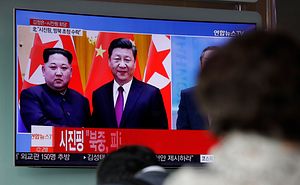President Trump’s team should take note of the overriding theme of the Xinhua news agency readout of the historic meeting this week between Chinese President Xi Jinping and North Korean leader Kim Jong-un. The Chinese statement emphasized tradition, longevity, and proximity in the statement, underlining that even though a new Kim now reigned in Pyongyang, the relationship between the two countries remains as close as ever.
Xi, however, is determined to restore Beijing’s influence in Pyongyang — influence that was lost and eroded in the aftermath of the 2013 purge of Jang Song-thaek, Kim Jong-un’s uncle and the erstwhile manager of economic ties between the two countries. Of the four proposals that Xi proffered Kim in Beijing, the first emphasized “high-level exchanges” between the two sides — a tactful acknowledgement on Xi’s part that China would like a better idea of North Korea’s intentions. His second proposal doubles down on this, by calling to “make full play of the time-tested valuable practices of strategic communication.”
To emphasize this in practice, it’s highly striking how much of the Communist Party of China’s leadership was in attendance for Kim’s visit. Aside from Xi, Li Keqiang, Wang Qishan, Wang Huning, Wang Yi, Yang Jiechi, and others joined to oversee what Xinhua described as an “unofficial visit.” This high-level show of attention from the leadership of a fellow nuclear state for Kim not only served to flatter the North Korean leader’s drive for status in Northeast Asia, but imbued Chinese calls for more frequent high-level contacts with a degree of credibility. Xi, too, has accepted an invitation to visit Pyongyang — an opportunity for him to make good on his proposed high-level interactions.
Kim, too, brought along a high-level delegation, bringing in tow Choe Ryong-hae, Kim Yong-chol, Ri Su-yong, Ri Yong-ho, and Pak Kwang-ho. (His sister, Kim Yo-jong, was conspicuously absent — perhaps managing affairs back in Pyongyang in his absence.) Kim reportedly told Xi that the purpose of his choosing Beijing as his first destination abroad was to “carry forward [the] tradition of DPRK-China friendship.” Kim also made the point that he wanted to inform Xi of developments in his country out of a sense of “moral responsibility.”
Interestingly, the 1961 Friendship Treaty between the two countries — the document that codifies China’s only mutual defense obligation — did not appear to come up during this meeting in Beijing. That document has drawn interest in recent years as talk of a possible U.S. preemptive attack has grown. In track-II settings and in occasional editorials in nonauthoritative Chinese state media, the treaty is not highly regarded; today’s interpretation holds that China would honor its defense obligation to North Korea should Pyongyang face external aggression, but it won’t cut Kim a blank check to launch an invasion of South Korea. Kim and Xi acknowledged the treaty’s 55th anniversary in 2016 and Kim Jong-il, during his last trip to Beijing before his death, also made note of the treaty alongside then-Chinese President Hu Jintao. The absence of any mention to that document here is curious, indeed.
Of course, the readouts released by both North Korean and Chinese state media have been carefully curated to give off the appearance of a successful and “comradely” encounter in Beijing between these two leaders. There remains the real possibility that Xi and Kim found areas to agree to disagree. But without any evidence, we are left only to speculate.
By hosting Kim, Xi appears to be making good on his promise, delivered during his presentation of the Communist Party’s Political Report during the 19th Party Congress last October, that China would never “swallow the bitter fruit of damage to its own interests.” This is as true on the Korean Peninsula as it is eleswhere in East Asia, including the East and South China Sea, where China perceives threats to its territorial integrity and sovereignty. China remains interested in seeing a nuclear weapon-free North Korea, but is aware of that a U.S. and South Korea-lead diplomatic process could produce an outcome detrimental to its interests.
With this meeting in Beijing, Xi Jinping has successfully thrust himself into the center of the burgeoning diplomacy in Northeast Asia around North Korea’s nuclear weapons and ballistic missiles. This process, that began with Kim Jong-un’s New Year’s Day address and the ensuing diplomacy in Seoul during the Winter Olympics, remains fragile and has the potential for an unexpected outcome. China’s continued quest for stability on the Peninsula demands that it avoid becoming a peripheral player as South Korea and the United States press on with Pyongyang.
In the meantime too, we should recall that Chinese and North Korean long-term strategic objectives in Northeast Asia have more in common than not: both Xi and Kim, after all, would welcome the eviction of U.S. forces and the U.S. extended nuclear deterrent from South Korea under the guise of the “denuclearization of the Korean Peninsula.”
A condensed version of this article appeared in a ChinaFile discussion on March 28.

































